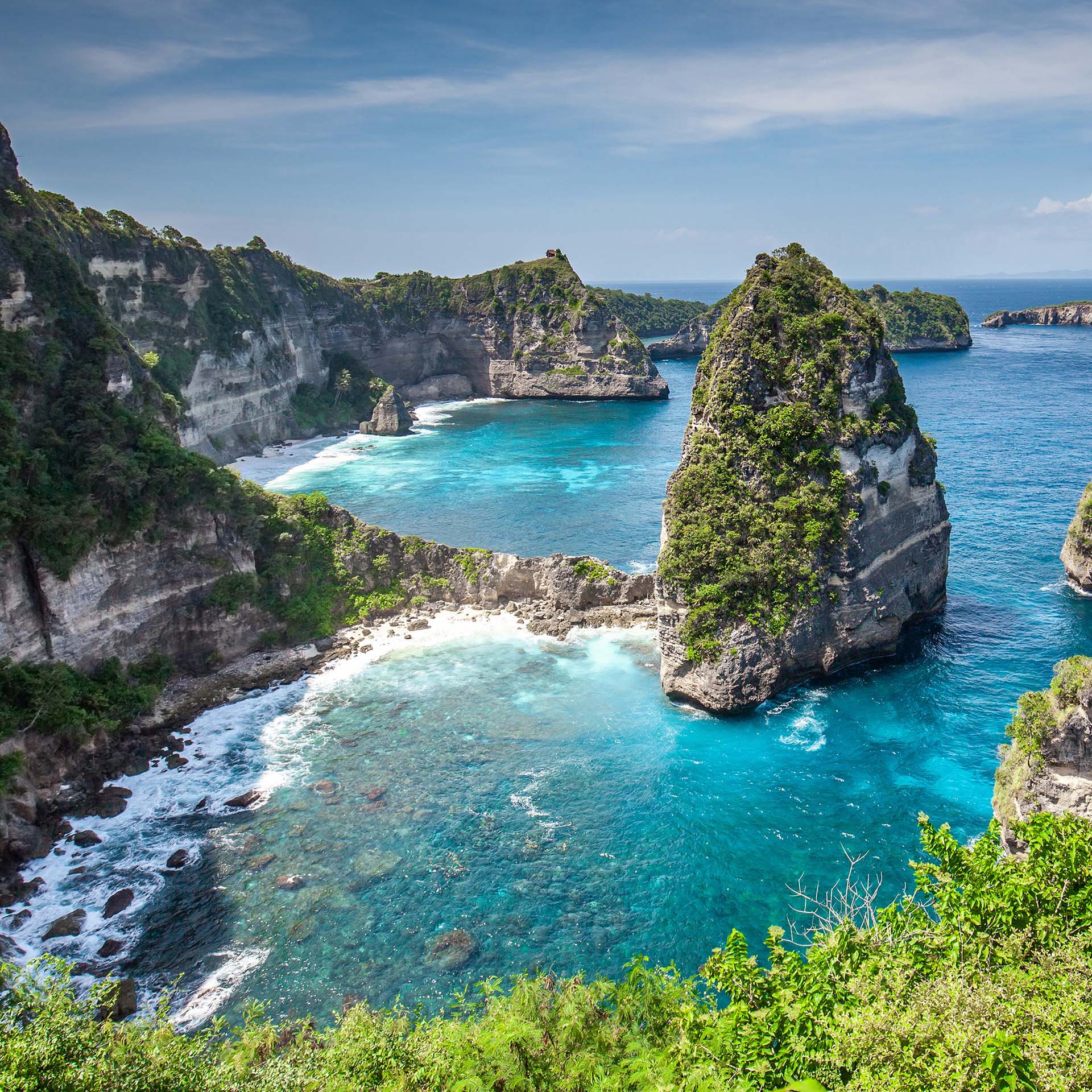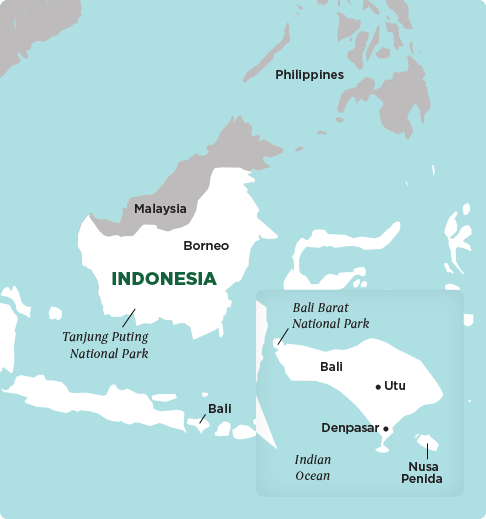Credits
6
Prerequisites
None
Courses taught in
English
Dates
Jun 1 – Jul 13
Program Countries
Indonesia
Program Base
Utu, Bali
Critical Global Issue of Study
Climate & Environment
Development & Inequality

Examine biodiversity, conservation, resource-use patterns, and the restoration of wildlife on the exotic islands of Bali and Borneo.
6
None
English
Jun 1 – Jul 13
Indonesia
Utu, Bali
Climate & Environment
Development & Inequality
One of the world’s recognized “megadiverse” countries, Indonesia is known for its primeval rainforests and wealth of natural resources including about 15,000 plant species. Take a journey through villages and volcanic landscapes, plantations and lushly forested conservation areas, as well as the stunning coral reefs, beaches, mangroves, and seagrass beds of this ecologically rich pocket of the world. Starting in Bali, on the grounds of an ancient palace complex, explore grassroots conservation focused on habitat restoration, community sustainability, and endangered species management. Witness extreme threats to animal and plant life posed by rapid growth in tourism and the palm oil industry. Learn from conservationists dedicated to protecting national parks in Java and Borneo, and observe the diverse community of primates and other large fauna. There will be opportunities to snorkel among the coral reefs and manta rays, hike in tropical forests, and visit conservation projects aimed at protecting the Bali myna, Bornean orangutan, and other endangered species.
None.


Study marine ecology and conservation on this small island neighboring Nusa Penida. The highly diverse reefs, mangroves, and seagrass beds around these islands have recently been declared a marine protected area (MPA). As part of this trip, discover and practice the field techniques used to monitor MPAs, including methods for surveying corals, fishes, and some of the significant megafauna such as manta rays. You will also learn from one of the most successful community-based conservation organizations for bird protection, which has successfully re-introduced the Bali Starling (Leucopsar rothschildi) to the wild after more than 25 years of trials by many parties including government, local and international NGOs.
West Bali
Learn about the lowland forests of West Bali National Park and the challenges they pose, especially for the only endemic species of Bali wildlife, the Bali starling (Leucopsar rothschildi). You will assess the application of conservation principles and their efficacy in managing West Bali National Park.
Central Bali
Learn about significant changes in the landscape due to natural causes at Batur UNESCO Global Geopark area, and visit the Geopark Museum to gain a better understanding of the forest’s natural regeneration. On your last excursion in Central Bali, you will stay in simple accommodations with magnificent rice terraces and mountains at Besikalung Wildlife Sanctuary. This is not only a community-based conservation area, but it is also a cultural UNESCO World Heritage site for a traditional rice farming practice known as Subak. Learn about wildlife conservation and local culture, as well as the main causes of forest conversion in Bali and other challenges. You will have a chance to live with a farming family and experience aspects of their daily lives.
North Bali
Examine coral reef conservation, fisheries management, and conservation of species in agricultural landscapes. Visit two important sites to learn about a Biorock coral restoration project and one of the best sustainable fish and coral reef harvesting activities for commercial purposes. Learn how local fisherman maintain their income by restoring and protecting the fish habitat and sustainably harvesting the fish.
On the easternmost part of Java, encounter some of the island’s largest forest remnants in a patchwork of conservation areas surrounded by intensively used farmlands. Here, the potential for biodiversity conservation is tightly linked to the community’s needs for space, food security, and opportunities to engage in the flourishing tourism sector, as well as invasive species control.
Take a seven-day excursion into conservation areas of the Tanjung Puting National Park, the site of the famous long-term study of orangutan ecology and conservation and home to a diverse community of primates and other large fauna. Observe primates in the park and other wildlife, and stay at the Friends of the National Parks Foundation (FNPF) conservation center, where the restoration of habitat on degraded land is a key project. In the surrounding plantations, mainly of oil palm, witness the precious value of habitat remnants and the ongoing pressure on them.
Please note that SIT will make every effort to maintain its programs as described. To respond to emergent situations, however, SIT may have to change or cancel programs.
Upon successful completion of the program, students will be able to:
The following syllabi are representative of this program. Because courses develop and change over time to take advantage of dynamic learning opportunities, actual course content will vary from term to term.
The syllabi can be useful for students, faculty, and study abroad offices in assessing credit transfer. Read more about credit transfer.
Biodiversity and Natural Resource Conservation – syllabus
(ENVI3010 / 3 credits)
This course focuses on biodiversity conservation in the ecological context of tropical Asian reef and rainforest systems. Against a backdrop of historical and contemporary patterns of natural resource use patterns in Indonesia and particularly Bali, students examine the responses of the biota to large-scale habitat loss and fragmentation, extraction of resources (for example timber and fishes), and changes to hydrological and nutrient dynamics that accompany conversion of the landscape to agricultural dominance. Understanding the processes and patterns of change gives students insight into potential solutions, which may include government-initiated programs, privately funded ventures, and community-based approaches. Students examine these different models by means of social, economic, and environmental indicators of success, looking in particular at integration of these aspects and potential for long-term, sustainable solutions.
Biodiversity and Conservation Field Study Project – syllabus
(ENVI3060 / 3 credits)
In this course, students engage in research on a topic of relevance to biodiversity and conservation in Bali. The emphasis in this project is on building a solid framework for facilitating field research, including development of appropriate research questions and methodology, use of literature and other resources to construct a strong context for proposed project work, and cultivation of sound primary data collection skills (including interview and laboratory-based skills as well as fieldwork in a narrower sense). Each student conducts research with a field component and produces an original academic paper whose contents are also presented orally to student peers. This course gives students the opportunity to engage in more detail with one of the themes examined in the seminar and to develop their research skills.



SIT Study Abroad is committed to ensuring that international education is within reach for all students. We believe in the transformative power of immersive, intercultural experiences and are dedicated to supporting students in their educational journey.
See Full Breakdown
A critical step in preparing for your study abroad program is planning how you will maintain your health and wellbeing. Please review the following information carefully and contact [email protected] with any questions or concerns.
View Information